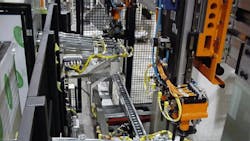ThyssenKrupp Offers Amnesty in Anti-corruption Drive
FRANKFURT -- Heavy industry giant ThyssenKrupp (IW1000/75), rocked by a slew of corruption scandals, said Tuesday it will not prosecute or fire employees involved in any wrongdoing if they cooperate in uncovering the malpractices.
"For employees who disclose compliance matters voluntarily, truthfully and fully ... and who cooperate unreservedly in investigating them, the executive board promises that it will not assert or enforce damage claims," the company said.
"Subject to this condition, the information provided in this connection will also not be used as a reason to unilaterally terminate the employment of the disclosing employee."
ThyssenKrupp, long regarded as one of the emblems of Germany's technological prowess, has seen its image tarnished recently in the wake of a series of corruption allegations, including a price-fixing cartel, luxury trips laid on for journalists and alleged bribery in contracts in eastern Europe and China.
Last month, the group's supervisory board chief Gerhard Cromme quit over his handling of the scandals as ThyssenKrupp battles to clean up its image.
The industry giant, whose activities range from steel-making to elevators, industrial plant technology, submarines and car parts, said the amnesty to whistleblowers would run until June 15.
And it would not apply to management, it stressed.
"The program does not apply to the executive board members of ThyssenKrupp, business area management board members, the heads of the operating units, and the managing directors of group companies," the statement said.
"ThyssenKrupp is in the middle of a major change process," including an attempt to radically reshape its corporate culture, the company said.
Among the values that it now stood for, "compliance is a must," it said.
"Overall ThyssenKrupp is making good progress... But despite considerable efforts to communicate a shared understanding of values, there have been a number of serious compliance violations in recent times which have caused huge damage to the group's image," the statement complained.
Copyright Agence France-Presse, 2013
About the Author
Agence France-Presse
Copyright Agence France-Presse, 2002-2025. AFP text, photos, graphics and logos shall not be reproduced, published, broadcast, rewritten for broadcast or publication or redistributed directly or indirectly in any medium. AFP shall not be held liable for any delays, inaccuracies, errors or omissions in any AFP content, or for any actions taken in consequence.
